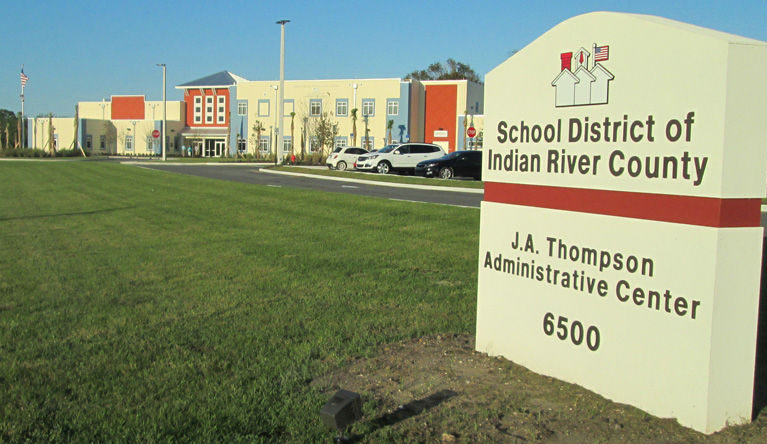
INDIAN RIVER COUNTY — Indian River County School District Superintendent Mark Rendell wants to expand the number of vocational classes offered at Vero Beach and Sebastian River high schools, adding HVAC, electrical and plumbing to the existing career tech curriculum.
That makes sense, since district data show career tech classes are wildly popular.
In fact, a majority of high school students, including many college prep kids, take a career tech class. At Sebastian River High School, 1,147 out of 1,779 students – or 64 percent – take a career tech class. At Vero Beach High School, 1,473 – or 52 percent of the 2,806 students – do likewise.
And a large percentage will graduate with career technology degrees – nearly 40 percent this year at both high schools.
Those students went through a three-year program and will graduate not only with a high school degree, but also with an industrial or professional certification that gives them a jump- start into the workforce or college.
Each high school offers 10 three-year career tech programs, with some overlap. Both offer biotechnology, digital design, nursing/home health aide, culinary arts and automotive. In addition, Vero offers carpentry, digital video, accounting, business management and drafting, while Sebastian River has programs in GIS (geographic information systems), network support, entrepreneurship, criminal justice and welding.
Kristine Burr, director of the career tech program at Sebastian River High School, said the school’s most popular three-year programs are nursing, automotive and culinary arts. Gina Hodges, director of the Vero Beach career tech program, said nursing, carpentry and digital video are the top three there.
Rendell said the impetus for adding HVAC, electrical and plumbing classes to the career tech curriculum comes from businesspeople who have told him there is a shortage of qualified workers in the building trades, which means well-paying jobs likely will be available for graduates.
“Expanding our career and technical programs, what used to be called ‘vocational’ programs, will provide another curriculum offering for our students,” he said. “We already have some very strong programs and if we are able to provide additional programs focused on industrial arts, it will not only benefit our students, but will directly benefit our community.”
If voters see fit to renew a special four-year property tax this summer, Rendell plans to use part of the revenue to fund the HVAC, electrical and plumbing shops he has in mind.
The new classes would be “self-sustaining” after the initial investment is made to equip and house the shops, he said.
Dr. Michael Arnett, who oversees the career tech program, explained during a tour of the Sebastian River High School classes that the state – which disburses state and federal funds – largely controls the career tech program. It defines the course offerings, he said, and schools must choose from a set menu.
A school district’s choice is further constrained by the college offerings in the area and the partnerships it can form with local institutions. Indian River State College is the local School District’s career-tech partner.
“All programs have to align with and track into Indian River State College associate-of-science or bachelor-of-science degrees in order to get federal money,” Arnett said. The state also has changed its funding formula to reward classes that are geared toward achieving an industrial or professional certificate.
All full-time career tech students are funded at the base rate of $4,300 each, but an additional $430 can be earned if a student is awarded an industrial or professional certificate, and the money must go back to the successful class.
Cash-starved school districts follow the money, selecting classes that result in students passing a professional certification.
“Schools used to offer only a few programs with certifications. The shift in funding has forced educators to go to certified fields, making the school responsive to industry,” Arnett said.
“I have one employer interested in CNAs (certified nursing assistants) who wants to hand out the certificates and hire the whole class,” Sebastian’s Kristine Burr said. Champion Home Healthcare is the employer and Director Helen Perrotta said, “Those young men and women come out of both school nursing programs so experienced and capable, I hire as many as I can.”
Wylie Green’s entrepreneurship class at Sebastian is actually a business within the school called “Shark Wear,” a T-Shirt and printing business. It is not only self-sustaining, but has provided students with $60,000 in scholarships over the last 14 years, Green said.
“When students come to me and say this organization wants a T-shirt, I tell them, ‘Make it happen,’” Green said. “They have to figure out the staffing, the concept, the delivery and answer for the project’s rights and wrongs. I don’t have to tell them what to do. They are focused and ready to work when they come in here.”
Rick Appel, who runs the culinary arts program at Sebastian, has a student restaurant and catering service that’s so busy it has to turn down business. It caters events throughout the year including the Special Olympics in November, where the students make food for 2,000 people.



